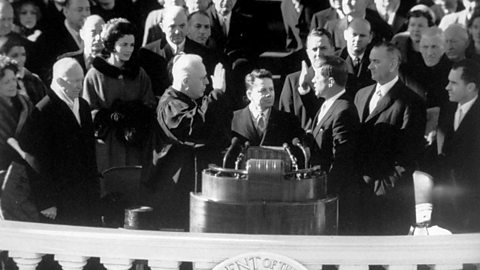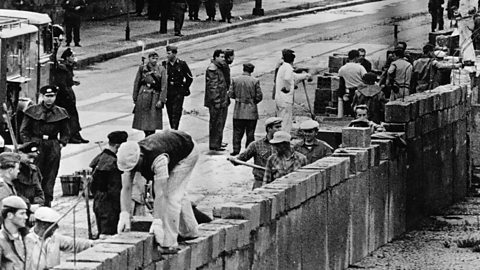The Berlin Wall

President John F Kennedy took office in January 1961 promising an uncompromising attitude towards the Soviet Union and international communismA classless society where all property is owned publicly..
In 1959 Khruschchev’s ultimatum on Berlin had been withdrawn, but Khrushchev believed he might be able to dominate the younger and inexperienced Kennedy. He reissued the ultimatum on Berlin at a conference in Vienna in June 1961 and once again gave the US six months to withdraw. However, Kennedy refused to withdraw the American troops and in fact increased defence expenditure in Berlin in case of a conflict with the USSRUnion of Soviet Socialist Republics - collection of states, also known as the Soviet Union.. The world was left wondering 'what will happen next?'.
Why was Berlin divided?
At the Yalta ConferenceA meeting of Churchill, Stalin and Roosevelt in 1945, where they planned the war’s end, the division of Germany into occupation zones and how post-war Europe should be organised. of 1945, Germany and its capital Berlin were both divided into four zones of occupation.
Berlin lay well inside the Soviet zone of occupation and was a source of tension throughout the Cold War. This had first become apparent in 1948 with the crisis over the Berlin BlockadeOne of the first Cold War crises when the Soviet Union blocked the Allies access to West Berlin in 1948. It ended in 1949 after daily western airlifts of supplies to their zones made continuing the Blockade pointless..

On 13 August 1961, the Soviet authorities in East Germany sealed off East Berlin – their zone of occupation - by constructing a huge barbed wire barrier. This was soon replaced by a concrete wall, complete with lookout towers and armed guards who had orders to shoot anyone trying to cross into the Western sector.
Why was the Berlin Wall built?
- The Brain Drain: throughout the 1950s thousands of East Germans had fled to the West through Berlin, leaving behind the harsh political climate and economic hardship of life under communismA classless society where all property is owned publicly.. Many of those who defectMoving from one area to another, normally because of a preference for a way of life or political beliefs. Eg people defected from East to West Germany were educated or highly skilled workers and the East German authorities could not afford to lose their best and brightest citizens.
- Lure of the West: during the 1950s travel was relatively easy between the Eastern and Western sectors of Berlin. People living under communism in the Eastern sector could visit the West and see what capitalismAn economic system based on privately owned, as opposed to state-controlled, businesses and the creation of profit. offered. There was better housing, shops full of goods and relative freedom: all provided by the Western Allies.
- Espionage: Berlin was a Western island in a communist sea – an ideal place for American spies to gather intelligence on the Soviet military.